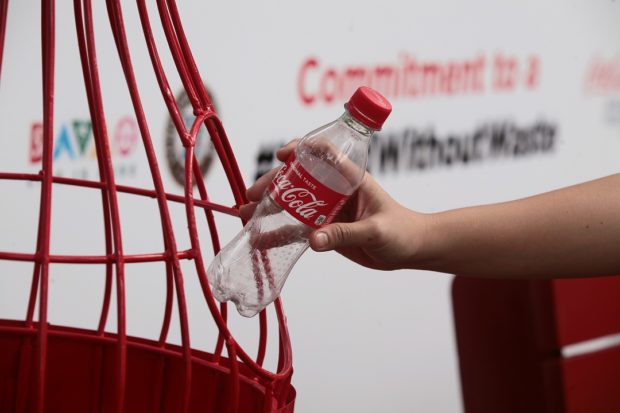Coca-Cola partners with PBSP, PLAF to collect, recycle plastic packaging
Plastic waste pollution continues to be a growing problem in the Philippines and the world as millions of tons of plastic end up in our oceans, endangering marine life and contributing to climate change.
Coca-Cola Philippines, in line with its vision of a World Without Waste—where the company aims to help collect and recycle the equivalent of every bottle and can it sells by 2030—has joined hands with its long-time partner, the Philippine Business for Social Progress (PBSP), and budding social enterprise, the Plastic Flamingo (PLAF), to help improve the collection and recycling of plastic PET packaging at the community level.

Coca-Cola, in line with its vision of a World Without Waste, partners with Philippine Business for Social Progress (PBSP) and Plastic Flamingo (PLAF) to help improve the collection and recycling of plastic PET packaging at the community level.
“This is a pressing and urgent issue and we can’t solve it alone. We need to collaborate with partners who have similar goals. We’re excited to work with PBSP and Plastic Flamingo and we know this project will have a big impact in terms of improving the collection of recyclable packaging in communities. We’re making sure that these initiatives are inclusive and will benefit the environment and those in the informal waste sector,” said Anthony “Tony” del Rosario, President of Coca-Cola Philippines and VP for Coca-Cola Franchise Operations in the East Region (Vietnam, Cambodia, and the Philippines).
Providing inclusive circular economy solutions for the waste value sector
Coca-Cola aims to help solve the global plastic packaging crisis by providing inclusive circular economy solutions. These include projects to prevent recyclable packaging from ending up in landfills and the oceans, while empowering the waste value chain by providing waste pickers with proper equipment and skills training.
With the partnership with PBSP and Plastic Flamingo, Coca-Cola aims to help collect at least 500 metric tons of plastic waste within one year across traditional collection points, junk shops, and communities in Muntinlupa City. The project will involve collaboration with 27 junk shops and 20 waste collectors in the target area who will be educated on the different plastic types.
Through PBSP, the collectors will be provided with tools for collection such as tri-bikes and other resources to support their health and livelihoods such as personal protective equipment (PPEs), health insurance, and vitamins. These are on top of the premiums they receive collecting recyclable plastic materials that can help in improving and uplifting their lives.
“The problem of solid waste, particularly flexible plastic, has skyrocketed during the pandemic and threatens the environment more than ever. This project, while helping the environment, will help waste pickers in Muntinlupa earn income from the waste collected,” said Elvin Ivan Y. Uy, PBSP executive director. “PBSP and Coca-Cola aim to make the project more responsive and inclusive. While our advocacy is to lessen waste in the environment, this project also ensures that upcycling activities like PLAF’s will help make our waste reduction efforts sustainable.”
Plastic waste gathered by partner collectors will be sold to the designated junk shops, who will then deliver the raw materials to PLAF facilities for upcycling.
Working towards a world without waste
Coca-Cola continues its commitment to reaching a World Without Waste through various partnerships and initiatives including its partnership work with Plastic Bank, World Wildlife Fund Philippines (WWF-PH), PeacePond Farmers Association (PFA) and other like-minded organizations. At present, Coca-Cola Philippines, in partnership with its local social investment arm, the Coca-Cola Foundation Philippines, has empowered nearly 40 communities in 22 provinces across the country with opportunities to better manage their solid waste.
The company is also accelerating the launch of a major new PET recycling facility in General Trias, Cavite. The facility–a joint partnership between local bottler, Coca-Cola Beverages Philippines and Bangkok-based Indorama Ventures, a global leader in packaging solutions and green technology–will be the largest bottle-to-bottle recycling plant in the Philippines and is expected to process around 30,000 metric tons of used PET bottles and produce around 16,000 metric tons of recycled PET resin every year.
Coca-Cola is committed to multi-stakeholder partnership action and believes that by working with NGOs, local government units, and communities, we can achieve a litter-free Philippines and improve the lives of those in the waste sector. To learn more about World Without Waste and read Coca-Cola’s latest Business and Environmental, Social, and Governance Report (ESG) Report, please visit www.coca-colacompany.com.
ADVT